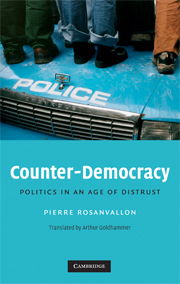Part 1 - Overseeing democracy
Published online by Cambridge University Press: 24 May 2010
Summary
The idea of a power of surveillance or oversight has a long history. The need for surveillance was invoked early in the French Revolution in reaction to the tendency of representatives to claim autonomy for themselves, to transform themselves into “a kind of de facto aristocracy,” to borrow Mirabeau's celebrated phrase. A member of the Constituent Assembly must have had the idea in mind when he spoke of “the nation's need for an overseer of the very representatives of the nation.” Elsewhere, a militant editorialist for La Bouche de fer admonished “friends of liberty” to see to it “that eternal oversight protects us from the dangers we would face if we placed all our trust in our ministers.” An influential woman of letters of the period made a similar point: “Representative government soon becomes the most corrupt of all if the people cease to scrutinize its representatives.” The watchful eye of the people became a central image of the revolution, reproduced on countless medallions and seals and incorporated into any number of the engraved allegories of popular power that reflected the spirit of the time. The overseeing counter-power was expected to limit the dysfunctions of the representative system and reduce disappointments due to the difficulty of establishing trust. It was understood as a way to transform distrust into an active democratic virtue. “Patriotic legislators, do not speak ill of distrust,” Robespierre contended.
- Type
- Chapter
- Information
- Counter-DemocracyPolitics in an Age of Distrust, pp. 29 - 32Publisher: Cambridge University PressPrint publication year: 2008
References
- 1
- Cited by

